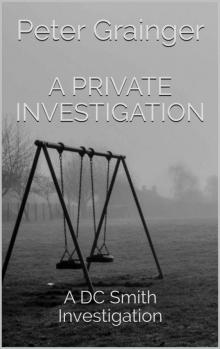- Home
- Peter Grainger
Songbird Page 36
Songbird Read online
Page 36
Waters said, ‘You knew Michelle, Ashley?’
‘Worked at the salon before I came here. I was the receptionist and did all the bookings. Michelle was the manager. You never imagine these things happening to someone you know, do you?’
Waters smiled again and said that he tried not to – Freeman stepped in beside him then and asked the girl how long ago she’d worked at the salon, but only in a friendly, conversational way. Ashley said she left in April, so that was about four months ago. Was it a coincidence, asked Freeman, that she’d changed jobs but was still working for the same family, more or less?
Ashley said, ‘Not really. S’where I met Graham. He saw me working and thought I was doing a good job. So he poached me, that’s what he said. This pays a lot better, so it was a promotion. And if my heating goes wrong, I get it fixed for free!’
Freeman laughed along with her, before she asked, ‘How did Michelle feel about that? Did she mind?’
Just the slightest hesitation, and a different look at the woman who must be a detective as well, although no one had actually said so.
‘She was a bit put out, but…’
Waters said, ‘I expect good receptionists are hard to find,’ and then he reminded Ashley to say who had called when Mr Fletcher got in touch or arrived back – Detective Sergeant Waters, Kings Lake Central CID.
As they walked back to the car, he noted the two vans in the yard, quite new, well-maintained vans, and through a metal roller-door, tidy racking full of parts for the central heating business. There was a storeman talking to one of the fitters, both wearing company overalls; they stopped and watched as the two visitors crossed the car park. He had yet to meet Graham Fletcher but he’d learned something about him in the past few minutes.
When he was back behind the wheel with the engine running, Waters said, ‘Not much of a motive – an argument over a receptionist which leads to murder.’
‘No. I don’t fancy your chances when you run that past Detective Sergeant Wilson and co…’
Freeman was watching him again, waiting for a reaction to the name. When she realised there wasn’t going to be one, she said, ‘But we found out something useful, didn’t we?’
‘Did we, ma’am? I’m still processing it.’
‘Never mind. You can’t help being a man. We found out that your Mr Fletcher used to visit his sister-in-law’s hairdressing salon, at least up to April, when he pinched her receptionist. Why did he do that? I mean visit a salon. Maybe he’s fussy about his hair. Maybe the heating broke down a lot.’
Waters checked his notepad, typed Barry Simms’ address into the satnav, selected a route and drove slowly towards the entrance that would take them back into the town. Freeman’s point would have occurred to him in time, but not that quickly.
‘And we also know,’ she said, ‘that buxom young Ashley says her boss’s name a lot. She says it every chance she gets. Graham… Graham…Graham…’
He watched as the senior investigating officer passed a limp hand across her brow and pushed out her chest, which, as Waters had noticed before, was the very opposite of buxom, and panted a little. Quite how funny this was intended to be he wasn’t certain, but he did laugh.
Barry Simms was not at home. They walked around to the rear of the property and looked in through windows but the house was empty. Waters had the number from Serena already in his phone, and he called it while they stood in the shade and admired the neatly manicured garden. There were smiling plaster gnomes around a small pond, red water-lilies and goldfish basking in the sunlight.
Simms answered and told Waters he was at work, on the early shift, he’d be back a little after two o’clock. He could meet them at the factory or they could wait until he returned, but he couldn’t get home straight away because the company’s German owners were in the building and-
‘Mr Simms, it isn’t anything urgent. We’re in Luton and we just wanted a brief word. We try to keep people informed.’
Freeman was pointing at the phone in Waters’ hand and then at her ear. He understood and pressed the loudspeaker symbol so she could hear the conversation.
Barry Simms said, ‘You’re going to charge him? Is that what this is about?’
‘Charge who, Mr Simms?’
‘The person you’ve arrested. Just a kid, isn’t he? Some sort of mental case?’
Freeman looked as surprised as Waters but she didn’t intervene – this was his call and his problem. And the problem was that nothing had been made public about the arrest of Oliver Salmon.
Waters said, ‘May I ask where you heard that, Mr Simms?’
‘Michaela told me at the weekend.’
Waters repeated the question – did Simms know where his sister-in-law had heard the story, and the answer was, from her husband.
‘From Graham Fletcher?’
‘Yes.’
Freeman made no sound but shaped her lips into a silent whistle.
Waters explained that charges had not been made, that the investigation was ongoing and that Mr Simms might be able to help them further. Would he, as Michelle’s next of kin, give consent for them to look at her bank accounts?
The surprise on Freeman’s face was genuine but again she made no attempt to intervene. Waters reflected that if the two of them had talked more about the case on the drive down, she’d know what this was about.
‘Michelle’s bank account? Why?’
It’s routine, Waters said, to look at every aspect of a victim’s life.
Simms said, understandably, ‘But what about this person you’ve arrested? Have her bank accounts got anything to do with him? They can’t have… I don’t get where this is going now. What’s happened to the two women I met? The other detectives?’
Waters said, turning away from Freeman’s gaze, ‘Mr Simms, this is still a major investigation, as it should be. There are lots of detectives involved. DCI Reeve and DC Butler are colleagues of mine and they told me how helpful you were when they spoke to you. We have made an arrest but the person concerned has not been charged, which means the investigation is continuing. As a part of that, we’d like to take a look at Michelle’s accounts. As I said, this is something we would usually do in a case like this one.’
Alright, said Simms – was giving his verbal consent enough? Waters said he would email the question to make it official. If they could have the reply and the account details today… Simms told him then that the two of them had shared a current account but that Michelle also had her own at the same bank. Waters asked him to send details of and consent for both.
When the call was over, he turned to see Freeman standing by the pond. He went across and saw her staring into it, watching the fish, red, silver and gold, suspended in their cool, circular world, motionless in the shade under the pads of ornamental lilies.
She said, ‘I read the entire file last night. I didn’t notice anything that would make me ask to see her bank accounts.’
He explained – it was something Serena had said, about whether Michelle had ever followed through with a fertility clinic. If she had, there were significant sums of money involved. Reeve and Serena were both sure her husband knew nothing about it. It wasn’t anything like a lead, of course, but if she had been killed by someone she knew, with emotional complications? If there was someone else in her life? And before Freeman responded he thought, mention this to Serena, get her to cover for me there – he couldn’t ever say that the question had first been posed by Jo Evison. Life in a squad run by Cara Freeman would never be straightforward.
She said, ‘OK, fine. How did Fletcher get hold of the stuff about Oliver Salmon? Any ideas?’
Waters shook his head and said, ‘I’m as certain as I can be that no calls to the family have been made by anyone on the team. It was made clear it would be too controversial because of Oliver’s disability, too disruptive.’
‘Nevertheless, he’s found out. Mr Fletcher really has taken an interest, hasn’t he?’
She looked up
and around the rest of the garden – the newly-mown lawn with trimmed edges, a trellis full of sweet peas, marigolds in lines along the borders, and further back a small vegetable patch with a cane pyramid of runner beans no one would ever eat, because they almost never do.
Freeman said, ‘This isn’t her, is it? This isn’t Michelle Simms.’
Reeve and Serena had said the same thing, and Waters marvelled at it. Men work things out but women just know them. Smith had always said the best-balanced team for any sergeant was two of each.
Freeman turned and they walked back around the house to the car. She asked where he planned to go now, and he said Michaela Fletcher was the final person he’d hoped to meet, though of course he hadn’t yet come face to face with her husband.
Freeman said, ‘You know you’ve really rattled his cage, don’t you? I’d be surprised if Ashley hasn’t rung Graham already, and he might have heard from Gleneagles by now. Barry Simms might get in touch as well, if they’re mates. If he has, what do you think Fletcher will do?’
Waters pushed the key into the ignition but didn’t turn it.
‘I’d say he has three choices. He could ring me and be outraged, demand an explanation and accuse me of harassment. He could remain absolutely silent, which would be smart but suspicious. Or he could already be on his way to Luton airport with a suitcase he packed earlier.’
‘You seriously fancy him for it?’
‘Every time I look at him, there’s a new question mark. And I don’t believe Oliver Salmon killed her. I haven’t from the start.’
‘Just the old DNA getting in the way, though…’
Freeman took out her phone and read through several texts. If they were related to work, to this case, she didn’t share any of it with him. That didn’t matter. He had the odd feeling, almost the physical sensation, that something would break soon. He’d worked hard enough and taken enough from those who disagreed with him and disliked him, and in the end, it evens out. You hang in there and eventually it swings back in your direction.
Freeman said, ‘Is this Smith’s way, what you’re doing with Fletcher?’
Of course it was. Could he have dreamed of doing what he was doing now when he went into Kings Lake Central that first morning, when he stood there with Charlie Hills and DC wandered in and asked if he’d lost his tricycle? Some people alter your life forever the moment they walk into it.
Waters said, ‘He used to say that sometimes you have to set fire to the forest to see what runs out. Not in every case – it’s risky and it can get out of control. But he also used to say that if you always minimise risk, you also minimise results. I think he was right about that.’
Freeman shrugged and said, ‘Well, you couldn’t argue with his results. You could about everything else, I’m guessing, but not that. Let’s go and see Mrs F. If the call comes through, put it on speaker and I’ll recor-’
Waters’ mobile burst into life, the old-fashioned telephone bell at full volume. There was no name but he recognised the number because it was written on a leaflet in his trouser pocket. He nodded at Freeman. She took out her own mobile, pressed symbols and nodded back to him.
Then he accepted the call and said, ‘Good morning, Mr Fletcher. Detective Sergeant Waters, Kings Lake Central CID. Thank you for getting back to me.’
Chapter Thirty-Four
‘Ford, are you sure? This looks a bit leafy to me.’
Ford’s Ford – Serena still found this hysterical - didn’t have a built-in satnav but he had memorised the address. He nodded and said, ‘The Glebe School, Meadlands, Little Swaffham. This is Meadlands Way.’
They had left the village behind several minutes ago, and were in the countryside again. The road was no more than a lane, and if they met any traffic, something would have to give way. Tall old oak trees lined the route and the succession of bends meant you couldn’t see far enough ahead to be sure you were going towards any particular destination. Serena Butler said that maybe Meadlands and Meadlands Way were entirely different places but Ford was, as usual, cheerfully undeterred.
She thought back over the awkward scenes in the office – Detective Inspector Terek now openly hostile to Waters, Detective Sergeant Wilson ready to exploit that, and, sooner rather than later, Detective Chief Superintendent Allen getting involved. This was unlikely to end well for Waters. Alison Reeve knew enough of the history to have kept the peace since Smith retired but now she was out of the picture; Cara Freeman, in a situation like this one, was an unknown quantity. Why had she, as the senior investigating officer on the case, decided to disappear with Chris Waters for most of the day? Was she about to break some bad news to him?
And more to the immediate point, why was she, Detective Constable Serena Butler, on this wild goose chase? A full work-up on a suspect, especially one about to face at least a manslaughter charge, was normal procedure, but interviewing their schoolteachers? Really? She’d met Michaela Fletcher and had formed something of a connection. Wouldn’t it have made more sense to let her go down to Luton again and build on that, if Waters was anywhere near right about her husband, Graham Fletcher?
‘I reckon that’s it, over on the right.’
Ford pointed through the trees. Across an expanse of open parkland, they could see a large and imposing building, Victorian or Edwardian, built in the grand style. In front of it were several cars, too many for it to be a private residence any longer. A blue and white sign came up on the right, and sure enough it announced that they had found The Glebe School. There was the obligatory mission statement – “To listen, to understand, to care”.
She said, as Ford turned onto the gravel drive, ‘This reminds me of where I went to school.’
‘Really?’
‘Yep. Except that nobody listened, nobody understood and nobody cared.’
There was a secretary and an appointments book – the secretary checked they were in the book, and then she directed them to a couple of chairs in the reception space. Mr Longhill would be with them in a few moments. It all had the feeling of being a private clinic rather than a school for rich kids with disabilities.
There was no noise, and the two of them waited in silence – anything they said would have been overheard by the secretary. The Salmons have money, and this is what it buys you, of course. Serena felt the old resentment rising up. She knew it could get in the way of the job. Mr Longhill was, or rather he had been, Oliver’s tutor. She needed to get this out of the way as quickly as possible without getting into any sort of discussion about how state education might be considerably improved if everyone in the state went to its schools rather than buying their way out of them. She needed to get back onto the case. Had Freeman given Waters a rocket? Had they met Graham Fletcher? Was it safe to text her sergeant and ask, if Freeman was around?
Footsteps, and then Longhill was walking towards them across the polished wooden floor. It had to be him – about forty, collar and tie, glasses and a beard, naturally. Introductions were made and he shook their hands before inviting them to follow him into the building. They made turns this way and that before they were unexpectedly outside again and crossing a courtyard towards a single storey prefab which looked old enough to have housed lawnmowers and the equipment for the tennis courts from the days when this had been a private residence.
‘This is my domain,’ Longhill said, ‘and it was Oliver’s classroom.’
‘How many in a class?’
Longhill detected something in that, and he looked at Serena for a moment before he responded.
‘Six if they were all present, but that didn’t happen often. Absence rates are high, for obvious reasons.’
There were three tables pushed together in the centre of the room to make one, and around them were eight chairs, two on each side. On three sides of the classroom there were low cupboards against the walls, and the upper surfaces were covered in books, folders, paints and painting equipment, computers and monitors reflecting the history of IT in education since th
e very beginning of time, an acoustic guitar, a violin, a stuffed owl in a case and an extraordinary miscellany of smaller objects. The walls were covered in prints – some of famous paintings, others of abstracts and patterns – and in between these were various educational posters. The entire space had the air of an old-fashioned, eccentric and slightly chaotic primary school classroom.
Longhill offered them seats at the central table and took one himself, facing them. Then he said, ‘Oliver…’
Serena said, ‘Yes. Oliver Salmon.’
The teacher wasn’t in a hurry. He had the patient manner that the good ones have, and he was thinking about how to say what he wanted to say.
He said, ‘Would you like me to go first? Or would you rather ask questions?’
Easy. Smith had hammered this home often enough – if they want to talk, let them. What they volunteer is usually more useful than what you have to squeeze out of them. Serena invited Longhill to say his piece.
‘I know what this is about. I’ve spoken to Erica, Oliver’s mother.’
He paused, and Serena said they didn’t have a problem with that. On first name terms with parents, though.
‘Fine. Then I have to say that in my opinion the idea Oliver is capable of violence towards anyone is absurd. I’ve worked with him in this room for five years. In that time, you get to see all sides of a young person. I’ve seen him angry, upset, in tears, and I’ve seen him creative, excited and happy. Never once have I seen anything to suggest he is likely to harm anyone. I refuse to believe that he has.’
Was there a tremor of emotion in the voice? She took another look at Longhill. He’d said his name was Trevor, and she wondered whether she should use it at some point.
She said, ‘Can I ask whether the class is a mixed one? Do you have girls as well as boys?’
‘Was. It was a mixed class. They all left in the summer, bar Ivan. We called it our graduation class this year.’
Longhill got up and went to the wall on his left. He pointed to a group of photographs.

 Persons of Interest
Persons of Interest A Private Investigation
A Private Investigation Songbird
Songbird On Eden Street
On Eden Street An Accidental Death
An Accidental Death Time and Tide
Time and Tide An Accidental Death: A DC Smith Investigation
An Accidental Death: A DC Smith Investigation In This Bright Future
In This Bright Future Lane: A Case For Willows And Lane
Lane: A Case For Willows And Lane The Rags of Time: A DC Smith Investigation
The Rags of Time: A DC Smith Investigation Luck and Judgement
Luck and Judgement Persons of Interest: A DC Smith Investigation
Persons of Interest: A DC Smith Investigation Lane
Lane But For The Grace
But For The Grace Time and Tide: A DC Smith Investigation
Time and Tide: A DC Smith Investigation In This Bright Future: A DC Smith Investigation
In This Bright Future: A DC Smith Investigation The Rags of Time
The Rags of Time But For The Grace: A DC Smith Investigation
But For The Grace: A DC Smith Investigation Luck and Judgement: A DC Smith Investigation
Luck and Judgement: A DC Smith Investigation